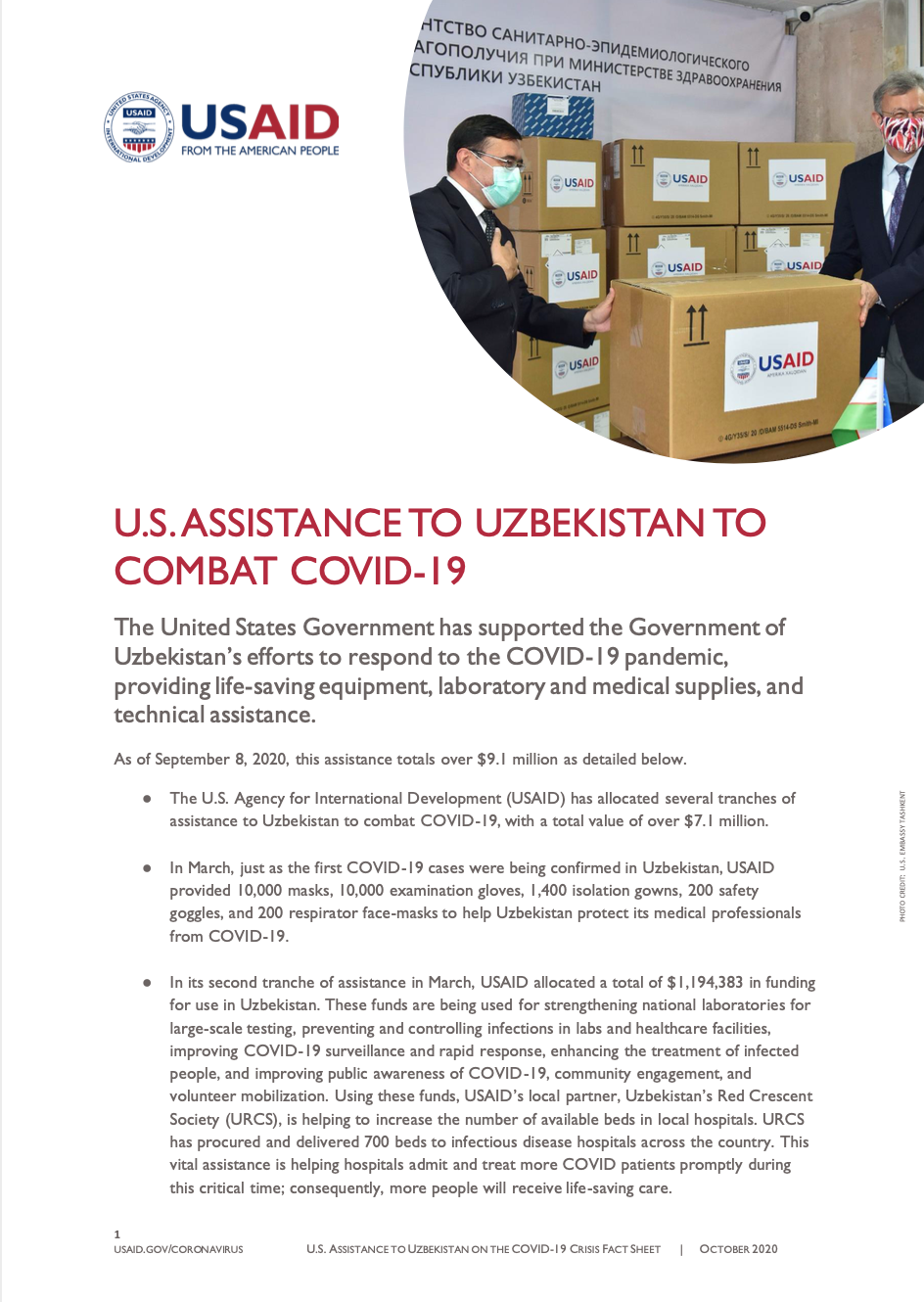Speeches Shim
U.S. ASSISTANCE TO UZBEKISTAN TO COMBAT COVID-19 ![]() (pdf - 870k)
(pdf - 870k)
The United States Government has supported the Government of Uzbekistan’s efforts to respond to the COVID-19 pandemic, providing life-saving equipment, laboratory and medical supplies, and technical assistance.
As of November 15, 2020, this assistance totals over $9.1 million as detailed below.
- The U.S. Agency for International Development (USAID) has allocated several tranches of assistance to Uzbekistan to combat COVID-19, with a total value of over $7.1 million, with an additional $2.07 million provided by the U.S. Centers for Disease Control.
- In March, just as the first COVID-19 cases were being confirmed in Uzbekistan, USAID provided 10,000 masks, 10,000 examination gloves, 1,400 isolation gowns, 200 safety goggles, and 200 respirator face-masks to help Uzbekistan protect its medical professionals from COVID-19.
- In its second tranche of assistance in March, USAID allocated a total of $1,194,383 in funding for use in Uzbekistan. These funds are being used for strengthening national laboratories for large-scale testing, preventing and controlling infections in labs and healthcare facilities, improving COVID-19 surveillance and rapid response, enhancing the treatment of infected people, and improving public awareness of COVID-19, community engagement, and volunteer mobilization. Using these funds, USAID’s local partner, Uzbekistan’s Red Crescent Society (URCS), helped to increase the number of available beds in local hospitals. URCS has procured and delivered 700 beds to infectious disease hospitals across the country. This vital assistance helped hospitals admit and treat more COVID patients promptly during this critical time, enabling more people to receive life-saving care.
- On May 22, USAID announced an additional $3 million to further support Uzbekistan’s efforts to fight and contain the spread of COVID-19. The USAID-funded Local Health System Sustainability project is using this assistance to enhance diagnostic capacity, supply chain management, case management, and COVID-19 surveillance systems and rapid response, including through technical assistance and procurement and distribution of medical/lab equipment and supplies. By October, USAID provided essential COVID-19 testing reagents, lab equipment, and consumables valued at $2.36 million to Uzbekistan’s Ministry of Health’s Agency for Sanitary and Epidemiological Wellbeing (ASEW).
- On September 3, USAID donated 200 ventilators valued at approximately $2.6 million to assist Uzbekistan’s fight against COVID-19. USAID worked closely with the Ministry of Health and other stakeholders in Uzbekistan to place these ventilators in health care facilities throughout the country. The donated ventilators are of the highest quality, made in the U.S. with cutting-edge technology. They are compact and easy to deploy, and can support both invasive and non-invasive applications, which will give Uzbekistan’s health workers flexibility in treating patients affected by the virus. USAID is also conducting training for health workers and is providing ongoing maintenance so that hospitals can continue to operate the equipment safely for years to come. The ventilators can also be used to treat patients for other respiratory ailments.
- The U.S. Centers for Disease Control and Prevention (CDC) has allocated $2.07 million to address the most urgent needs of the Ministry of Health, including laboratory supplies and equipment for COVID-19 testing, training for public health workers, technical assistance for disease surveillance along Uzbekistan’s borders, as well as the development and implementation of treatment guidelines for COVID-19 patients.
- Aside the CDC funding described above, since the outbreak of the pandemic, the CDC Uzbekistan Country Office has been supporting the Ministry of Health’s ASEW by organizing trainings and providing technical assistance on emergency operations, laboratory operations, infection prevention and control, screening at ports of entry, risk communication and community engagement, and disease surveillance. CDC also supported the translation of international technical guidance documents into Russian for distribution.


Comment
Make a general inquiry or suggest an improvement.